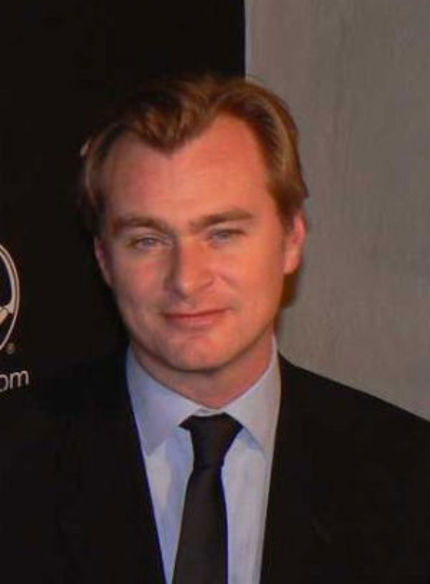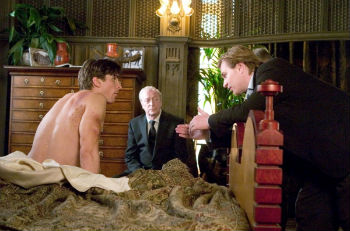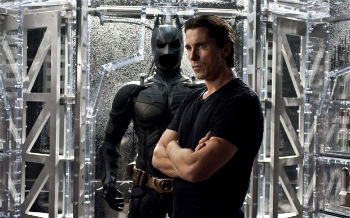Hollywood Grind: The Dark Rise of Christopher Nolan

Often thrilling, sometimes spine-tingling, and just as often portentous and ponderous, The Dark Knight Rises represents the bleakest Hollywood blockbuster in recent memory.
It is filled with contradictions, an ensemble social drama that dares to criticize the greed of corporations and the individually wealthy, even while taking full advantage of a budget reported to be in excess of $200 million, supplied by corporations and the individually wealthy. It contains an excess of plot holes and emotional manipulations and befuddling characters and bizarre twists and self-referential grace notes. It features extended action sequences that pummel and punish and rarely satisfy.
And it makes one wonder where Christopher Nolan will go from here.
Nolan began making Super 8 films as a child, attended a university in London with an emphasis on film, produced corporate training videos, and finally cobbled together a tiny budget to make Following, his first feature. He exploded into film-nerd consciousness with Memento, his "noir in reverse," which startled and pleased, and then did Insomnia, a remake with Al Pacino.
His first trilogy (as it were) revealed a filmmaker who was eager to take risks, visually and narratively, and appeared to prize characters over action. He was developing his own dark vision, revolving around "heroes" who were not terribly heroic, or necessarily even likable, in the traditional sense. They were motivated by intuition and self-preservation, making them desperate and dangerous.
From the narrative standpoint, both Following and Memento played with chronological tricks. In his second colloboration with cinematographer Wally Pfister, Nolan accomplishes something more subtle and, yes, more sleepy and sneaky in Insomnia, playing around with the perspective of Al Pacino's haggard detective as he engages in a battle of wits with presumed killer Robin Williams.
 Nolan's inclinations became more pronounced in his next four films. Batman Begins rebooted the franchise with grand style, establishing Bruce Wayne as a new conflicted hero for the 21st Century, distinct from innumerable previous versions in comic books, movies, and television. He's Nolan's most immediately likable protagonist, a man haunted by memories and guilt and remorse, yet determined to put others ahead of himself -- even if the "others" don't realize they need, much less want, his help.
Nolan's inclinations became more pronounced in his next four films. Batman Begins rebooted the franchise with grand style, establishing Bruce Wayne as a new conflicted hero for the 21st Century, distinct from innumerable previous versions in comic books, movies, and television. He's Nolan's most immediately likable protagonist, a man haunted by memories and guilt and remorse, yet determined to put others ahead of himself -- even if the "others" don't realize they need, much less want, his help.
Meanwhile, Nolan explored other facets of his creativity with The Prestige and Inception, two films which seemed to call back to Following and Memento with their narrative gamesmanship. The Prestige feels modest in retrospect, especially in comparison to Inception, but both take delight in presenting visual wonders that build throughout their respective stories.
In between, of course, Nolan made The Dark Knight, which was defined by the unsettling villainy of Heath Ledger as The Joker, and pushed Bruce Wayne toward the more depressing, self-pitying aspects of his personality. The darkness is leavened by the lighter touches, even as was The Prestige, but it feels as though Nolan was walking toward an abyss, an abyss that felt even closer in Inception.
The abyss does not quite claim The Dark Knight Rises, but it threatens to do so throughout its running time.
With the passage of eight years, Bruce Wayne (Christian Bale) has become reclusive in his retirement. As usually happens with those who withdraw from the world, he loses perspective on what's important, crawling into his own private shell, shunning interactions with those who might help, such as the loyal Alfred (Michael Caine), until finally he is galvanized into action.
 Nolan brings back a couple of characters -- Commissioner Gordon (Gary Oldman), Lucius Fox (Morgan Freeman) -- but spends much more time with the introduction of main threat Bane (Tom Hardy) and those who line up for and against him, including cat burglar Selina Kyle (Anne Hathaway) and police officer John Blake (Joseph Gordon-Levitt). There is more, much more to the story, and even more characters to consider, but those have been ably considered by my colleague James Marsh in his review, and I agree with most of his compliments, concerns, and conclusions.
Nolan brings back a couple of characters -- Commissioner Gordon (Gary Oldman), Lucius Fox (Morgan Freeman) -- but spends much more time with the introduction of main threat Bane (Tom Hardy) and those who line up for and against him, including cat burglar Selina Kyle (Anne Hathaway) and police officer John Blake (Joseph Gordon-Levitt). There is more, much more to the story, and even more characters to consider, but those have been ably considered by my colleague James Marsh in his review, and I agree with most of his compliments, concerns, and conclusions.
Watching the film in a non-IMAX theater, I was keenly aware of its limitations, but those limitations -- mostly related to the script -- can just as easily be spotted in Nolan's earlier work. (Hint: watch the opening scene of the The Dark Knight and concentrate on the extraordinary timing with events beyond the control of the participants.) The Dark Knight Rises feels more bleak, perhaps, because Batman Begins was so hopeful: for the character, for the superhero sub-genre, for the possibility that summer blockbusters could be ambitious as well as financially profitable while simultaneously delivering huge action bangs and booms.
In the concluding film, Bruce Wayne is more desperate than ever to connect, which makes him more dangerous. Yet he's not terribly successful in making those connections on his own merit; he has to rely on his reputation more than anything else, and an extraordinary series of coincidences and lucky breaks in order to put himself into a favorable position. In those aspects, too, he reminds of the "heroes" of Memento and Insomnia and Inception, men who are acting, largely, out of an instinct for self-preservation. For Bruce Wayne, the question becomes: Can he rise above his own selfish instinct? Whether the movie succeeds on that score is ultimately left to the viewer to decide.
As for Christopher Nolan, he is now freed now from the franchise he brought back to life, delivering three films that confronted the very nature of superheroes in modern society. He faces an open road. But the darkness still awaits.
Hollywood Grind is a weekly column. The Dark Knight Rises is now playing in theaters throughout the known universe.







